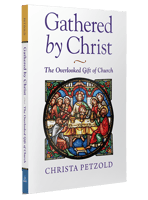“The church is not a building.” Have you ever heard someone say this? I know I have! This statement is true on its surface—the church is the whole people of God, called from among every nation to belong to the Body of Christ. The church is also the gathering of these people in a specific location around the Word and Sacraments that Jesus has instituted for us. When people say, “The church is not a building,” what do they mean by that statement, and is the sentiment expressed true or false?
Myth 1: The Church Is about Doing
Sometimes when we pit the church building against the church people, we are suggesting that Christians are most fully being God’s people when they’re out there sharing the Gospel, ministering to others, and being the hands and feet of Jesus. Christians are surely supposed to do these things. Jesus says, “By this all people will know that you are My disciples, if you have love for one another” (John 13:35). And Jesus’ final command before He ascends into heaven is, “Go therefore and make disciples of all nations” (Matthew 28:19).
A healthy church should be doing things that share Jesus’ love and care with their members and those in their community because this love for neighbors is the natural response of those who are being sanctified and made more like Christ day by day. Even so, doing these good works is not what makes us the church. It indicates the presence of the church, but it is a result of the church existing, not the defining factor. Many organizations provide services of care in their communities—feeding the hungry, caring for the sick, and assisting people in finding jobs or other resources they need. These organizations are not churches just because they care for people. A church exists where God’s Word is faithfully taught and where the Sacraments are rightly administered.
We must keep this distinction in our minds so we do not slip into error. Emphasis on what the church does can lead us to works-righteousness—looking to what we are doing as the indication of our standing before God. Or this emphasis can lead us to compromise the content of our faith out of a desire to be ecumenical or appear more friendly. If we think that doing good deeds for others makes us the church, then we may be willing to associate with organizations that do similar acts of service but do not preach the Gospel. I am not suggesting that we should never work with Christians from other denominations! There are certainly appropriate times and places for doing so. But we should always consider the clarity of what is being taught both to our own members and to those outside the church. The foundational element that makes us the church isn’t what we do. It’s what Jesus did for us when He died on the cross to save us from our sins.
Myth 2: The Church Is Intangible
Another reason why some might say the church is not the building is because they do not see the church as something with a tangible presence. In traditions with a low view of the Sacraments, where Baptism and Communion are seen as memorials or symbolic acts of man, there is very little theology to tangibly locate the church in a geographic place. Even before the pandemic, some of these churches were meeting online and even celebrating Communion online. If the only thing the church has to unite it is the disembodied Word of God, then certainly anyone can have the Word of God with them in their living room, and there is no need to gather together.
Of course, Bible-believing Christians will recognize that Jesus commands us to meet together. He instructs His people, “For where two or three are gathered in My name, there am I among them” (Matthew 18:20). And we read in Hebrews 10:23–25,
Let us hold fast the confession of our hope without wavering, for He who promised is faithful. And let us consider how to stir up one another to love and good works, not neglecting to meet together, as is the habit of some, but encouraging one another, and all the more as you see the Day drawing near.
The Word of God is foundational to our identity as the church, and Jesus unites His Word to physical things in the Sacraments. We recognize that Jesus gives us His true body and blood in the bread and the wine. This shows us that our God is not one of distant philosophies or mere spiritual truths. He comes to us in real, tangible ways. Jesus took on humanity and became one of us, walking this earth and touching and healing people not only of their physical infirmities but their greatest spiritual sickness—sin. Now Jesus is reigning, King over all of creation, and He comes to us just as truly and just as tangibly every time the Body of Christ participates in His Supper. In this meeting with Jesus, we are also forgiven of our sins.
Saying “the church is more than a building” is a bit like saying “Jesus is more than bread and wine.” Of course, these statements are true on the surface, but they minimize something miraculous and beautiful that God does for us by giving us the church. Participating in Jesus’ body and blood together connects us both to Christ and to one another, and we become the church—the Body of Christ—through this sacred meal. Bread and wine are not always Jesus’ body and blood, just as a building is not necessarily a church. But the gathering together around Jesus’ Word and Sacrament are what it means to be the church.
Gathering Together Fuels Sending Out
It is always dangerous to place gathering together in opposition to being sent out into the world. For God’s people, it is not one or the other. One comes first, and the other naturally follows. The church building symbolizes the rooted, safe, and connected nature of what it means to be God’s children, just as a family’s house comes to embody their concept of home. A family can move to a new house, and a congregation can change where she meets. But the dwelling together as a family is just as essential in God’s family as it is for any family.
In Revelation 21:2–4, we see this image of the new Jerusalem, the ultimate hope of the church:
And I saw the holy city, new Jerusalem, coming down out of heaven from God, prepared as a bride adorned for her husband. And I heard a loud voice from the throne saying, “Behold, the dwelling place of God is with man. He will dwell with them, and they will be His people, and God Himself will be with them as their God. He will wipe away every tear from their eyes, and death shall be no more, neither shall there be mourning, nor crying, nor pain anymore, for the former things have passed away.”
God will dwell with His people forever. Our churches are embassies of this kingdom of God that Jesus taught us is already at hand. When we gather together around the Word and Sacraments, “the dwelling place of God is with man.” We should always consider the gathering of the church to be central to our identities as Christians. The caring and evangelistic impulse flows naturally from time spent gathered together around God’s Word. Through this time in God’s presence, the Holy Spirit equips the Body of Christ to take the message of hope out into the world.
Scripture: ESV®.
Read Christa Pe tzold’s book, Gathered by Christ: The Overlooked Gift of Church, to see how the church is more than a building. It is a gift given by God to His people.
tzold’s book, Gathered by Christ: The Overlooked Gift of Church, to see how the church is more than a building. It is a gift given by God to His people.















